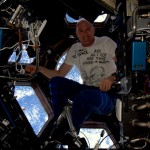Most of the astronauts and cosmonauts aboard the ISS have an amateur radio license. They use the station’s ham radio to contact amateur radio stations on ground mostly in their free time, and the radio is used to contact pre-selected schools. During the ten minutes that the ISS is typically above horizon and radio contact is possible, astronauts answer the questions prepared by the students.
Students from the American school of the Hague, the International School of Amsterdam and the British School in the Netherlands will gather at ESA’s European Space Research and Technology Centre, ESTEC, in Noordwijk, for their radio contact with the André on the ISS.
The contact will be operated by the ARISS telebridge station IK1SLD located at Casale Monferrato, Italy. The contact should be audible over most of Europe on the 145.800 MHz FM downlink. The contact will be conducted in English.
The students will ask as many of the following questions as time allows:
1. Eoin (14): Can you light a candle or magnesium in zero gravity?
2. Rachel (11): Do you get homesick?
3. Phoebe (14): After all the time and money invested into space travel what will be the main benefit to mankind?
4. Isaac (14): How long does it take to get to the ISS?
5. Lauren (11): Do you believe in aliens or life out there?
6. Ross (14): Do astronauts feel a temperature increase when re entering the Earth’s atmosphere due to the heat increase on the outside of the aircraft?
7. Wout (14): Can you see houses and man-made things from the space station?
8. Joep (11): How does it feel to be launched into space? Is it painful?
9. Saul-Patrick (14): On Earth we use north, south, east and west. How do you determine directions in space?
10. Ellie (11): When you push against the wall of the space station to move around does it change the orbit of the space station?
11. Sarah (11): Do you get to wear your own clothes or are you given special clothes?
12. Jonathan (14): Are there any similarities between space technology at the space station and Star Trek movies?
13. Michelle (14): What is the longest time you have been in space? And how do you communicate with your family?
14. Liam (11): Have you been out of the station and floated around in space?
15. Shaunnak (14): What are your views on commercial space travel?
16. Aidan (11): When did you become interested in space?
17. Igor (13): How does being in space affect your health and thinking processes?
18 Jella (12): After being in space so long and seeing earth from so far away, do you still see mankind in the same way?
19. Alma (12): Are there experiments happening on the ISS that can lead to knowledge about life on Mars? If so, what are they?
20. Miyu (13): Is there jet lag in space?
21. Natalia (12): How does day and night look like in space?
This call is made possible by the Amateur Radio in the International Space Station project (ARISS), an international working group, consisting of delegations from nine countries including several countries in Europe as well as Japan, Russia, Canada, and the USA. The organisation is run by volunteers from the national amateur radio organisations and the international AMSAT (Radio Amateur Satellite Corporation) organisations from each country. The volunteers work closely with the national space agencies, including ESA.


Discussion: no comments